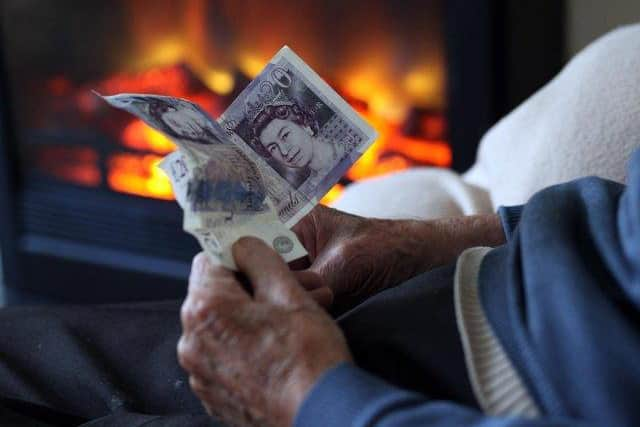Portsmouth groups 'extremely concerned' as rising numbers face eating-or-heating choice over cost of living crisis
and live on Freeview channel 276
According to the Bank of England’s calculations, someone earning £30,000 a year will be £600 worse off due to the cost of living crisis – the biggest fall since comparable records began in 1990.
It comes as households brace for the energy price cap to be lifted in April, with the average yearly energy bill set to increase by 54 per cent – up almost £700.
Advertisement
Hide AdAdvertisement
Hide AdThe News has repeatedly highlighted the plight of those already struggling as the energy and inflation crisis began to build.


Now community groups across the city are warning that the situation is becoming desperate for more and more residents.
Cheryl Coleman, manager of the Portchester Community Association, said that food banks and food pantries are seeing increasing numbers of new families in need.
She said: ‘Numbers have increased in the pantry over the last couple of weeks – people are getting more desperate.
Advertisement
Hide AdAdvertisement
Hide Ad‘There have been probably about a dozen new people come in last week – there could be even more people on Friday.


‘They all say it’s the cost of living and they are struggling to make ends meet.
‘There are quite a few who access the pantry who say, ‘I never thought I would have to rely on this’.
‘They say, ‘I work, I should be able to manage this, but I can’t – it’s so demoralizing’.’
Advertisement
Hide AdAdvertisement
Hide AdAnd the cost of living crisis has hit the pantry itself, with rocketing demand and food bills.


Last September saw the pantry face £200-a-week food shops to top up donations – now Cheryl says she wishes the cost was that low.
She said: ‘We are now paying £500 or £600 a week.
‘We still get a lot of donations from the local community, which is so generous.’
The city has a ‘well-earned reputation’ for its community spirit in the face of adversity, according to the CEO of a family support group, but ‘even Portsmouth will struggle to mitigate and adequately respond to the negative realities facing people’.


Advertisement
Hide AdAdvertisement
Hide AdCarole Damper, who for 22 years has served as CEO of the Roberts Centre in the city centre, said: ‘(We’re) so glad that The News is covering this to show that people care and that the difficult future so many face is difficult to comprehend.
‘With pensions and benefits being uplifted by 3.1 per cent and price rises projected at a minimum of six per cent, everyone will be worse off prior to the unprecedented energy increases.
‘It is a simple equation – when inflation is running higher than salary, pension, and benefits increases, and then on top of that utilities cost...(it equals) poverty, debt, despair, increased poor mental health, more evictions, increased homeless presentations, and so much more.
‘Organisations offering debt advice can only do so much when the gap between income, priority debts and basic home running costs is so out of kilter.’
Advertisement
Hide AdAdvertisement
Hide AdAnd struggling older people in particular are feeling the pinch, according to Steve Bonner, chair of the Pompey Pensioners, which supports more than 250 members.


The pensioner advocate said that more and more older people are facing the painful choice between eating or heating, and ‘almost certainly’ many more pensioners would find themselves tackling the stark decision in the coming months.
The 74-year-old said: ‘Older pensioners are already having to decide whether to eat, heat, or pay a bill.
‘Quite a few pensioners are too proud to claim the supplement they are entitled to. They see it as scrounging.’
Advertisement
Hide AdAdvertisement
Hide AdSteve added: ‘We are extremely concerned about how lower paid workers and of course pensioners are going to manage.
‘A large number of pensioners are extremely concerned – not just about rises now, but another one in October.’
Energy caps are reviewed and adjusted every six months, with the previous adjustment increasing the cap to £1,277 on August 6, 2021 – a rise of 12 per cent or £139, from the review at the start of last year.
Steve added that last year’s 3.1 per cent boost to the state pension had failed to keep up with the cost-of-living, which has increased 5 per cent with inflation over the winter.
Advertisement
Hide AdAdvertisement
Hide AdHe said the government had handled the ‘perfect storm’ of price rises ‘totally inadequately’.
He said: ‘The lower paid are going to suffer the most of this.
‘I imagine we will see a lot more people turning to food banks in the coming months.’
In an effort to cushion the hammer blow to households, the chancellor of the exchequer, Rishi Sunak, has announced that homes in council tax bands A-D will get a £150 rebate on their council tax, covering four out of five homes.
Advertisement
Hide AdAdvertisement
Hide AdBut energy companies are calling on the government to do more to help people.
Bill Bullen, founder and CEO of Utilita, which has a hub in Gosport, said that the government had failed to take notice of industry recommendations that would slash household bills.
The energy boss said: ‘‘Last summer Utilita submitted a white paper which gave BEIS the blueprint to help every household save as much as a fifth on their energy bills, through smart technology, that all suppliers have the power to provide. Had the Government taken notice, and acted, all households would be on their way to making vital savings by now, but instead, the Government is introducing ill-targeted financial measures that won’t go far enough.
‘Despite the rising price of wholesale energy, a spike of this magnitude could still have been avoided had the regulator not made grave errors, despite suppliers’ warnings.’

